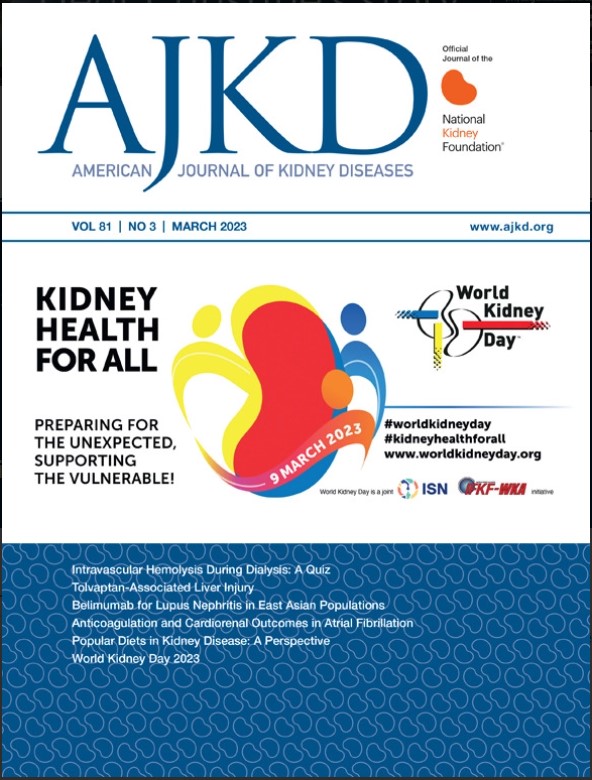Pharmaceutical Practice Considerations Regarding Adoption of the Race-Free Chronic Kidney Disease Epidemiology Collaboration (CKD-EPI) 2021 Equations.
IF 8.2
1区 医学
Q1 UROLOGY & NEPHROLOGY
引用次数: 0
Abstract
The race-free Chronic Kidney Disease Epidemiology Collaboration (CKD-EPI) 2021 estimated glomerular filtration rate-creatinine (eGFRcr) equation is being adopted in the US. Elsewhere there is debate regarding its validation and adoption. Absence of a perfect solution and a lack of alignment present challenges when considering global clinical trials. Whilst acknowledging these challenges, GSK decided to adopt the CKD-EPI 2021 eGFRcr equation for new adult trials to support health equity and delivery benefits from standardized data management. The eGFRcr obtained using the CKD-EPI 2021 equation versus CKD-EPI 2009 equation is moderately lower in US Black individuals and moderately higher in non-Black individuals. Analyses before adoption suggested no major impact for study safety or efficacy evaluations although racial/ethnic representation may need to be examined in trials with an eGFR ≥60 mL/min/1.73m2 inclusion criterion, since enrollment of eligible Black participants could be reduced. Sensitivity analyses using 2009 and 2021 equations may be necessary to understand any effect size with population change, especially where there are kidney endpoints or relevant safety concerns. GSK plans to monitor the impact of adopting the CKD-EPI 2021 eGFRcr equation on adverse event reporting across studies and pharmacovigilance outcomes, and to monitor the evolution of regulatory guidance for eGFR equation implementation.关于采用无种族慢性肾脏疾病流行病学合作(CKD-EPI) 2021方程的制药实践考虑。
无种族慢性肾脏疾病流行病学合作(CKD-EPI) 2021年估算肾小球滤过率-肌酐(eGFRcr)方程正在美国采用。在其他地方,关于它的有效性和采用存在争议。在考虑全球临床试验时,缺乏完美的解决方案和缺乏一致性是目前的挑战。在认识到这些挑战的同时,GSK决定在新的成人试验中采用CKD-EPI 2021 eGFRcr公式,以支持健康公平,并从标准化数据管理中获益。与CKD-EPI 2009方程相比,使用CKD-EPI 2021方程获得的eGFRcr在美国黑人中略低,在非黑人中略高。采用前的分析表明,虽然在eGFR≥60 mL/min/1.73m2纳入标准的试验中可能需要检查种族/民族代表性,但对研究的安全性或有效性评估没有重大影响,因为符合条件的黑人参与者的入组可能会减少。使用2009年和2021年方程进行敏感性分析可能是必要的,以了解人口变化的任何效应大小,特别是在存在肾脏终点或相关安全问题的情况下。GSK计划监测采用CKD-EPI 2021 eGFRcr方程对研究不良事件报告和药物警戒结果的影响,并监测eGFR方程实施的监管指南的演变。
本文章由计算机程序翻译,如有差异,请以英文原文为准。
求助全文
约1分钟内获得全文
求助全文
来源期刊

American Journal of Kidney Diseases
医学-泌尿学与肾脏学
CiteScore
20.40
自引率
2.30%
发文量
732
审稿时长
3-8 weeks
期刊介绍:
The American Journal of Kidney Diseases (AJKD), the National Kidney Foundation's official journal, is globally recognized for its leadership in clinical nephrology content. Monthly, AJKD publishes original investigations on kidney diseases, hypertension, dialysis therapies, and kidney transplantation. Rigorous peer-review, statistical scrutiny, and a structured format characterize the publication process. Each issue includes case reports unveiling new diseases and potential therapeutic strategies.
 求助内容:
求助内容: 应助结果提醒方式:
应助结果提醒方式:


